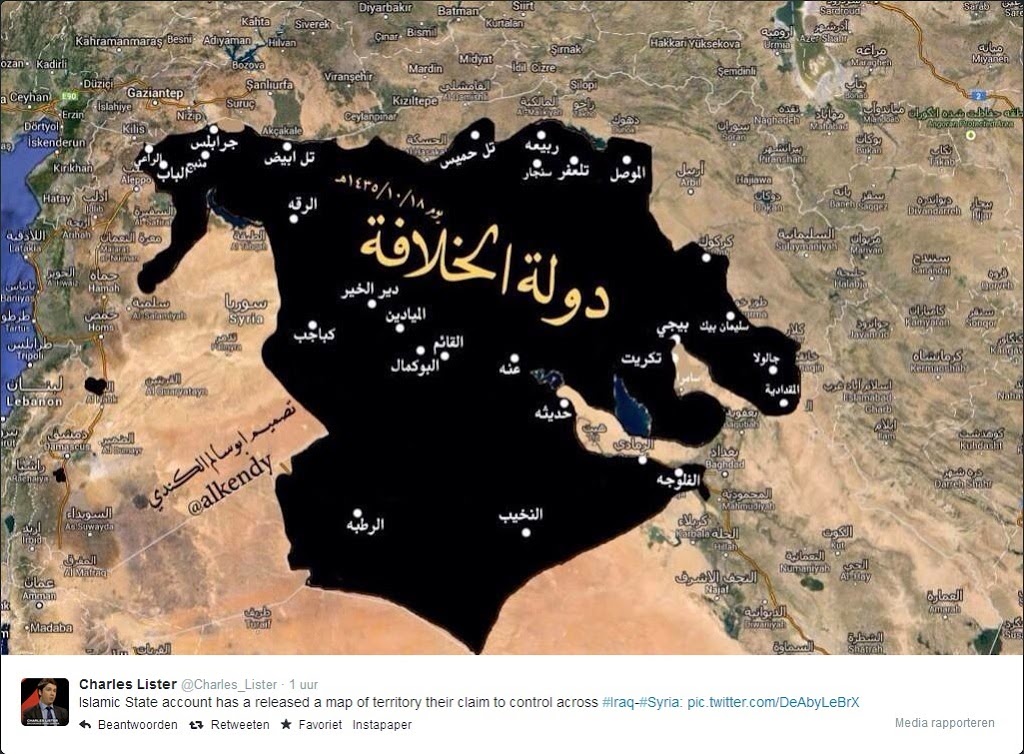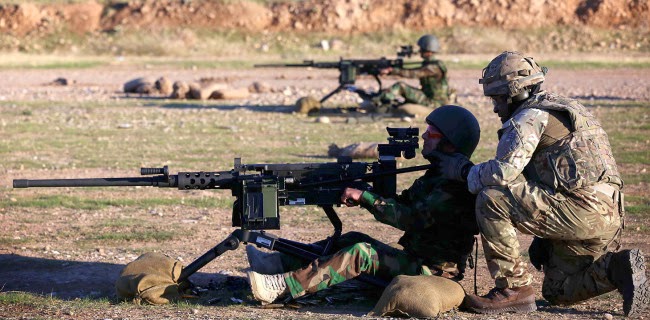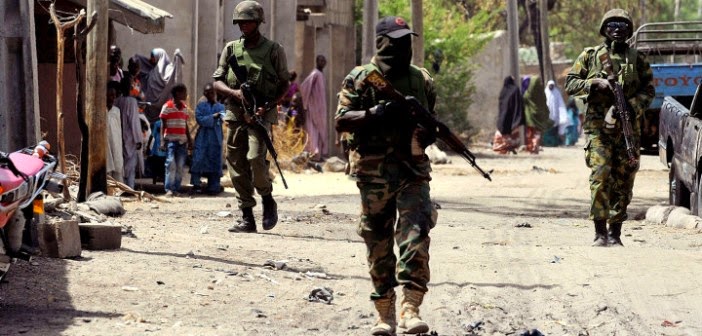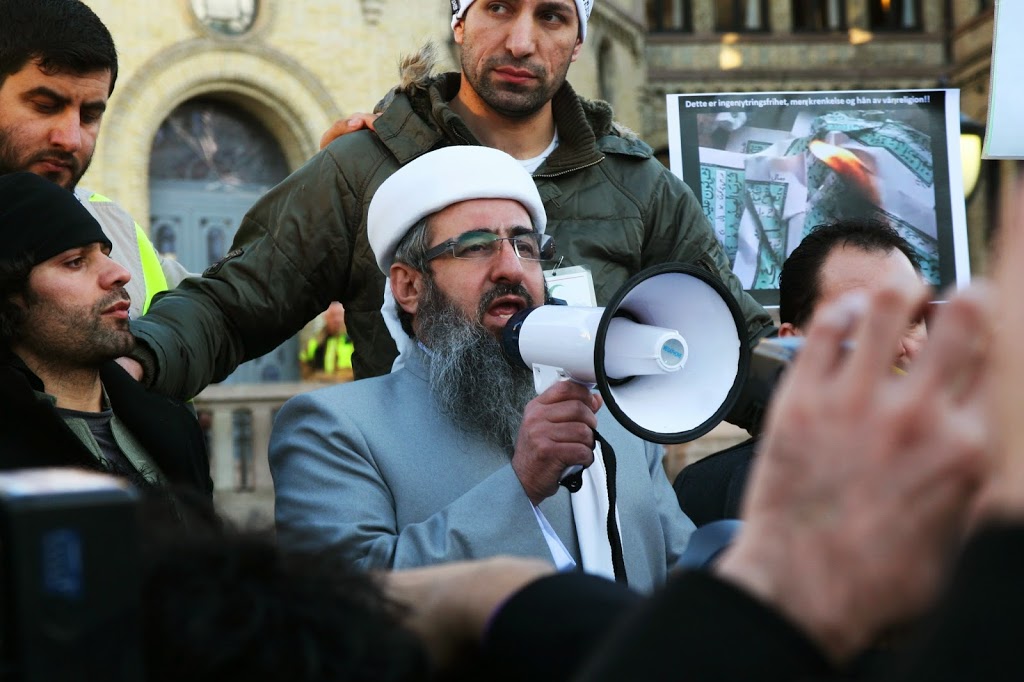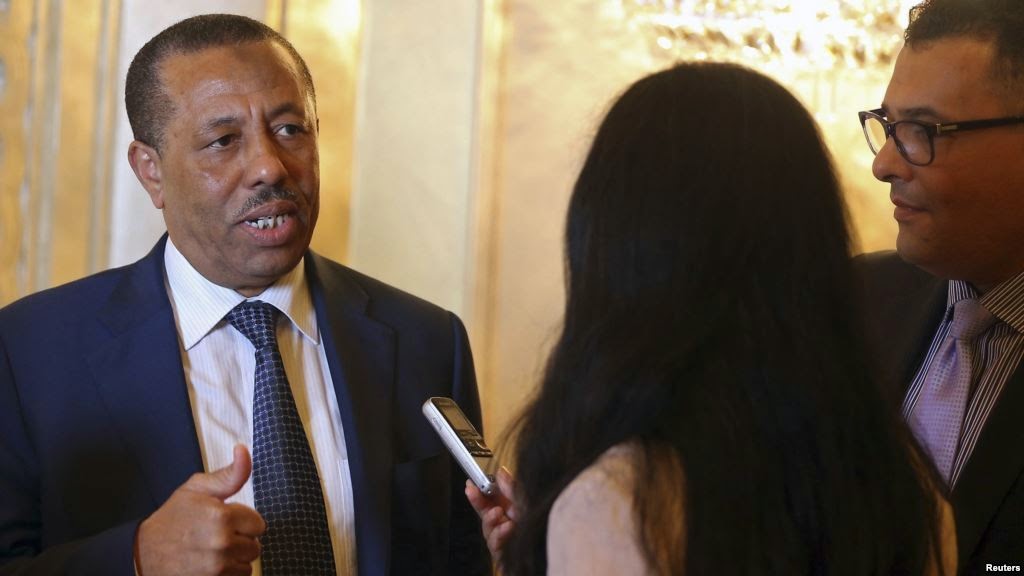Germany Sends Shipment of Heavy Weapons to Kurdistan
The German Defense Ministry has announced that it will send another cargo of heavy weapons and ammunition to the Kurdistan Region.
The equipment will be delivered in two stages, totaling 100 tons.
The announcement also states that 30 Peshmerga will soon travel to Germany for training in the use of new weapons.
The fighters will be sent to the Melborgen military base near Munich. The training will start on 2nd March and last two weeks.
German weapons have a good reputation on the frontlines, with Peshmerga sources regularly commenting on their effectiveness to BasNews.
Number of foreigners joining Peshmerga Forces on the increase
Former spokesman for the Ministry of Endowment and Religious Affairs of the Kurdistan Region Mariwan Naqshbandi says that the number of foreigners joining the Peshmerga to fight Islamic State (IS) is on the increase.
On his personal Facebook page, Naqshbandi said, “According to information that I have collected as a journalist, foreigners from many different countries have contacted Peshmerga officials and the ministry over the last two months, offering to volunteer for the Peshmerga.”
He stated that they have their own military equipment and that some of the volunteers are from the Kurdish diaspora, with citizenship of foreign countries.
“I asked one of those youths why he returned to the Kurdistan Region to fight IS with the Peshmerga. He said that the bravery and resistance of the Peshmerga illustrated in world media was a factor that motivated him,” said Naqshbandi.
Naqshbandi says that the volunteer explained, “Beside that, this is a fight of humanity against terrorists [IS militants]. If we don’t stop and destroy them here in the Kurdistan Region, they will have reach across the world in the future.”
According to unofficial statistics obtained by Naqshbandi, in 2015 alone, 25 foreign volunteers from Europe, the US and Australia have flown to the Kurdistan Region to join the Peshmerga.
He revealed that some had military training in their own countries and had been trained to fight in street battles.
Somalia: Al-Shabab makes a murderous bid to grab the world’s attention
A propaganda video released by Somali militant group al-Shabab, threatening attacks against shopping centres in the West, smacks of a bid to remain relevant as other extremist groups such as the Islamic State and Boko Haram grab the world’s attention.
The slickly produced 77-minute film, posted online this past weekend, calls for strikes on shopping streets and malls in London, the United States and Canada. “Westgate was just the beginning,” it proclaims, invoking what might cynically be described as al-Shabab’s greatest hit: the siege of the Westgate mall in Nairobi, Kenya, in which 67 people were killed by four gunmen.
But that was September 2013 and a great deal has happened since. The Islamic State has overrun swaths of Iraq and Syria and produced macabre videos tailored to the modern media cycle. Boko Haram has rampaged through northern Nigeria and stolen headlines with the kidnapping of 276 schoolgirls. Islamist gunmen stunned the world by attacking a Paris satirical magazine, killing 17 people over three days.
In the perverse battle for eyeballs and retweets, al-Shabab’s public relations department has been outwitted by its rivals and has lost territory after a hammering by US drones and African soldiers. Last September, its leader, Ahmed Abdi Godane, was killed in a US air strike, but his successor, Ahmad Umar Abu Ubaidah, has so far failed to establish a similarly high profile.
There are two ways for al-Shabab, an affiliate of al-Qaeda, to put itself back on the global agenda. One was seen last Friday with the suicide bombing of a Mogadishu hotel, killing 25 people and injuring more than 40 and denting hopes that the capital has unstoppable momentum with new business, a construction boom and a returning diaspora.
Boko Haram used “copycat tactics” by declaring an Islamic caliphate in northern Nigeria, but that option is not open to al-Shabab since its recent setbacks on the battlefield.
Anton du Plessis, managing director of the Institute for Security Studies, warns of the continuing potential for lone-wolf attacks. “Although they are on the back foot and have suffered losses, they are still a force to be reckoned with. Nobody knows the extent of their sympathisers in other countries.”
Though al-Shabab has carried out attacks in neighbouring Kenya, Uganda and Djibouti, which all contribute troops to the African Union force in Somalia, it has not operated outside East Africa and the Horn of Africa. Yet Minnesota, home to the biggest Somali population in the US, has been singled out by terrorist recruiters, according to Associated Press.
Since 2007, it said, more than 22 Somali men from Minnesota have travelled to Somalia to join al-Shabab, and a handful of Minnesota residents have gone to Syria to fight within the last year. At least one Minnesotan has died while fighting for the Islamic State.
Cedric Barnes, Horn of Africa project director at the International Crisis Group, says: “This video has a lot to do with recruitment. It is propaganda but it’s also a recruiting tool. There is now competition for radical young Muslims in the West: rather than al-Shabab, they might go for the immediacy of the Islamic State in Iraq or Syria. There are more rivals than there were.”
Stig Jarle Hansen, an academic on al-Shabab in Somalia, notes the group has “never staged an attack in a country that was not a part of the African Union forces fighting them. The most likely scenario is that this continues, but al-Shabab propaganda is professional; it might inspire sympathisers to act.”
Source: mg.co.za
Troops raid Boko Haram’s hideout in Yobe, Adamawa
The Director of Defence Information, Maj. Gen Chris Olukolade, has said some terrorists were killed by troops during a cordon and search operation along Djimillo-Damaturu.
Olukolade said the troops had a fierce encounter with the terrorists when their hideout was discovered by soldiers near a market.
He said the soldiers killed an unspecified number of the insurgents and recovered some machines guns and rifles from them.
He added that some of the terrorists were believed to have been killed in an inferno that gutted the house which they used as their base.
Olukolade said a soldiers was killed in the exchange of gun fire with the terrorists while another, who was injured in the gun battle, was undergoing treatment.
The Defence spokesman explained that the troops also had an encounter with some terrorists, who were in the process of blowing up a bridge to halt the military operation in Gulak, the headquarters of the Madagali Local Government area of Adamawa State.
He said the troops, who killed the insurgents, also recovered some arms and ammunition.
He added that flags, hoisted by the terrorists, were being dismantled by the troops in the operational area.
Source: punchng
Egypt, Libya Defense Ministers discuss means to fight Islamic State
Egyptian Defense Minister Col. Gen. Sedki Sobhi met with his Libyan counterpart Masoud Rahoma in Cairo for talks on bilateral cooperation to fight militants of the Islamic State (IS) group in Libya, military spokesperson Mohamed Samir said in a statement.
The meeting also tackled ways to enhance bilateral military cooperation through developing a strategy based on the exchange of security and military experiences between the two countries, according to the statement.
On Feb. 15, Egyptian armed forces, in coordination with the Tobruk-based Libyan government carried out an airstrike on alleged Islamic State group bases in Libya in response to the mass beheading of 20 Egyptian Coptic Christians by IS.
The attacks targeted camps, training facilities and weapons depots in the cities of Derna and Sirte.
Libyan Foreign Minister Mohammed al-Dairi appealed to the United Nations Security Council last week to lift an arms embargo on Libya to allow its military to fight militants.
The arms embargo was imposed in 2011 in the midst of a civil war between various opposition groups and forces loyal to late president Muammar Ghadafi.
Libya has slid into a security vacuum since then, with various militias controlling most of Libya, and an internationally recognized government based in the eastern city of Tobruk.
Egyptian court declares Hamas a ‘terrorist organization’
An Egyptian court declared Hamas a “terrorist organization” on Saturday, further isolating the blockaded rulers of the Gaza Strip once openly welcomed by the country’s toppled Islamist-dominated government.
The ruling is unlikely to have any immediate effect on Hamas, still reeling from last summer’s war with Israel and choked by an Israeli-Egyptian blockade set up in 2007. Moussa Abu Marzouk, Hamas’ No. 2 leader, is based in Cairo and is receiving medical treatment there, members of the group say.
The move underlines Egypt’s increasing hostility to Hamas, which the court blamed for violence in the country’s restive Sinai Peninsula. The secretive movement, founded in Gaza in 1987 as an offshoot of the region’s Egyptian-originated Muslim Brotherhood, faces a growing cash crunch and has yet to lay out a strategy to extract Gaza from its increasingly dire situation.
“There is no doubt that Hamas is being pushed into the corner further and further,” said Mkhaimar Abu Sada, a political science professor at Gaza’s Al Azhar University. Hamas’ relationship with Cairo has “reached a point of no return” and is unlikely to be salvaged, he said.
The ruling Saturday by Judge Mohamed el-Sayed of the Court For Urgent Matters said Hamas had targeted both civilians and security forces inside the Sinai Peninsula, and that the group aimed to harm the country. Sinai has been under increasing attack by extremists since the Egyptian military ousted Islamist President Muhammad Mursi in 2013.
“It has been proven without any doubt that the movement has committed acts of sabotage, assassinations and the killing of innocent civilians and members of the armed forces and police in Egypt,” the court wrote, according to state news agency MENA.
The ruling said that Hamas’ fighters had used heavy weapons against the army, and that the group was colluding with the Muslim Brotherhood, which Egyptian President Abdel-Fattah el-Sissi has described as the root of extremism. Mursi belonged to the Brotherhood.
“It has been also ascertained with documents that (Hamas) has carried out bombings that have taken lives and destroyed institutions and targeted civilians and the armed forces personnel,” the ruling said. “This movement works for the interests of the terrorist Brotherhood organization.”
On its official website, Hamas called the decision a “shocking and dangerous” one that targeted the Palestinian people.
“This decision is a great shame and sullies the reputation of Egypt. It is a desperate attempt to export the internal Egyptian crisis and will have no effect on the position of Hamas which enjoys the respect of all the people and leaders of the nation,” the statement read.
In Gaza, Hamas official Mushir Al-Masri condemned the decision and urged Egypt to reverse course.
“This ruling serves the Israeli occupation. It’s a politicized decision that constitutes the beginning of Egypt evading its role toward the Palestinian cause,” he said. “This is a coup against history and an Egyptian abuse of the Palestinian cause and resistance, which fights on behalf of the Arab nation. We call on Egypt to reconsider this dangerous decision.”
An Egyptian court banned Hamas’ military wing, the Izzedine Al-Qassam Brigades, and designated it a terrorist organization just last month. In 2014, a similar ruling in the same court banned all Hamas activities in Egypt and ordered the closure of any Hamas offices, though the order apparently was never carried out. Government officials in Egypt did not respond to requests for comment on Saturday’s ruling.
Hamas seized the Gaza Strip by force in 2007. Since then, it has fought three wars with Israel, the latest last summer killing some 2,200 Palestinians and 72 on the Israeli side, according to the United Nations.
Since a major attack on security forces last October, the Egyptian army has been clearing a buffer zone on the frontier with Gaza in an attempt to destroy a cross-border network of tunnels.
Hamas considers the tunnels an economic lifeline, at one point earning an estimated $500 million from taxing Egyptian imports. Cheap fuel, cement and other supplies from Egypt also powered Gaza’s economy, particularly the local construction industry which employed several tens of thousands.
That dried up after Mursi’s 2013 ouster. Egypt’s new government now sees the tunnels as a two-way smuggling route for guns and fighters.
Earlier this month, Egyptian security officials said they had found and shut down the largest-ever tunnel leading into Gaza, a 2.5-kilometer (1.5-mile) passageway they said was used to smuggle weapons used in attacks on security forces.
The crackdown has been accompanied by Egypt’s closure of the Rafah border crossing — the main gateway for Gazans to the outside world. That’s left Gaza’s population of 1.8 million people largely unable to travel abroad.
Hamas officials have said they believe Egypt is trying to crush their organization, but have refused to be quoted by name for fear that criticism of the el-Sissi government would invite further sanctions.
Mohammed Hijazi, a Gaza-based analyst, said the court ruling can be appealed. However, he cautioned that both sides needed each other.
“At the end of the day, Egypt needs to deal with Hamas because Hamas is a main player in the Palestinian arena and one day Egypt will find itself in a position to talk to Hamas if it wants to play a role in the Palestinian issue,” he said.
Source: arabnews
Mullah Krekar arrested for praising Charlie Hebdo attack and charged for “inciting criminal offences”
Libya’s PM says Turkey supplying weapons to rival Tripoli group
Libya’s internationally recognised Prime Minister Abdullah al-Thinni said his government would stop dealing with Turkey as it was sending weapons to a rival group in Tripoli so “the Libyan people kill each other”, ramping up his rhetoric against Ankara.
Two administrations, one in the capital and Thinni’s in the east, have been vying for power since an armed group called Libya Dawn seized Tripoli in July and reinstated lawmakers from a previous assembly, four years after Muammar Gaddafi’s ousting.
“Turkey is a state that is not dealing honestly with us. It’s exporting weapons to us so the Libyan people kill each other,” he told Egyptian TV channel CBC late on Thursday.
A spokesman for Turkey’s foreign ministry strongly denied Thinni’s allegations.
“Instead of repeating the same baseless and untrue allegations we advise them to support U.N. efforts for political dialogue,” spokesman Tanju Bilgic told Reuters.
“Our policy vis-a-vis Libya is very clear. We are against any external intervention in Libya and we fully support the ongoing political dialogue process under U.N. mediation.”
Thinni’s government said this week it would exclude companies from future deals, accusing Ankara of backing the Tripoli government and its allied armed groups.
He repeated that Turkish firms would be excluded from contracts in territory controlled by his government in the CBC interview, noting that any outstanding bills would be paid.
“We don’t say we are hostile to Turkey but we say we don’t deal with it,” he said.
Turkey is one of a handful of countries which has publicly received officials from the Tripoli government and parliament.
Critics of Ankara say its Libya policy is an extension of a pro-Islamist agenda which has already seen relations sour with other former regional allies, notably Egypt.
Thinni also accused Qatar of giving “material” support to the rival side in the Libyan conflict. He did not elaborate.
Army general Khalifa Haftar, who merged his forces with the army in the east to fight Islamist militants, is seen as a potential rival to Thinni. While the alliance between the groups has enabled them to win back territory, Haftar has been criticised for air strikes on civilian airports and seaports.
On Wednesday, a spokesman for Thinni’s parliament said the assembly’s president would appoint Haftar as top army commander.
Italian coastguard wants to carry weapons
Italy’s coastguard on Friday called on the government to change its status so that its 11,000 seamen can carry weapons, amid mounting concern over the possibility of attacks by people traffickers or terrorists.
The demand is a long-standing one but has been renewed following a recent incident in which traffickers armed with Kalashnikovs threatened coastguards engaged in an operation to rescue thousands of migrants in danger of drowning close to Libya.
It also follows signs that the Islamic State group has established a base in conflict-torn Libya, from where propagandists claiming to speak for the jihadists have threatened to mount attacks on southern Europe and merchant shipping in the Mediterranean.
The coastguard wants to be given the same status as Italy’s police forces, which would automatically give it the right to carry weapons.
A resolution adopted by the coastguard’s General Command called for urgent talks on the issue with Transport Minister Maurizio Lupi, whose department oversees the coastguard.
It said it was self-evident that the coastguard was now engaged in mainly policing activities and that having to rely on other forces for protection was “humiliating” and “seriously undermining staff morale.”
The resolution also highlighted the ordeal of coastguards who were threatened by armed people smugglers during a rescue operation on February 15.
As the coastguards evacuated a migrant boat, four smugglers arrived on a speedboat and forced them to hand over the empty vessel, which they then took off with, presumably for re-use in future crossings.
Italy’s Federation of shipowners called on the government to introduce naval patrols to protect fishing boats operating in international waters between Italy and North Africa.
“Our fisherman are afraid of being attacked by terrorists, they cannot be allowed to live with the nightmare of not coming home,” the federation’s chairman, Carmelo Micalizzi, said in a statement.
“They need to feel protected and more at ease in a Mediterranean that becomes more dangerous every day.”
Dwindling stocks closer to Italy have forced fishermen in Sicily to venture further afield and many now depend for their livelihood on catching tuna, swordfish and prawns in waters close to Africa.
- « Previous Page
- 1
- …
- 160
- 161
- 162
- 163
- 164
- …
- 268
- Next Page »
